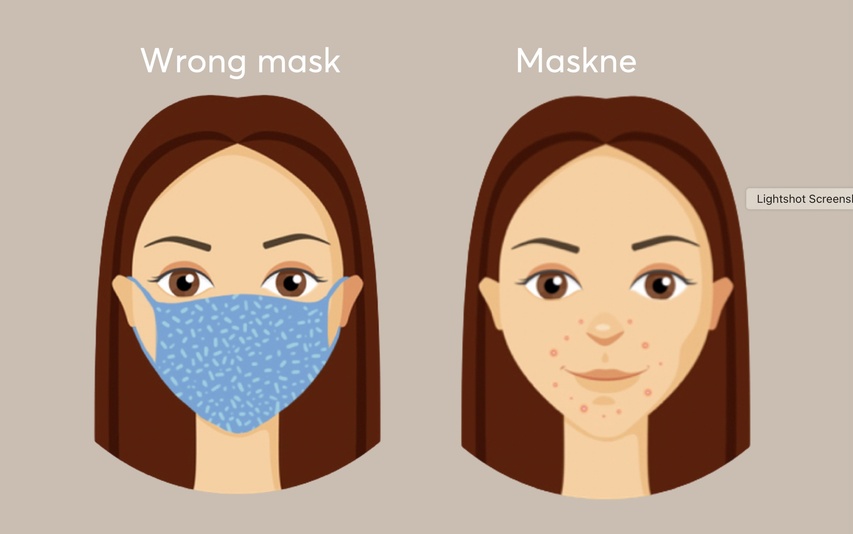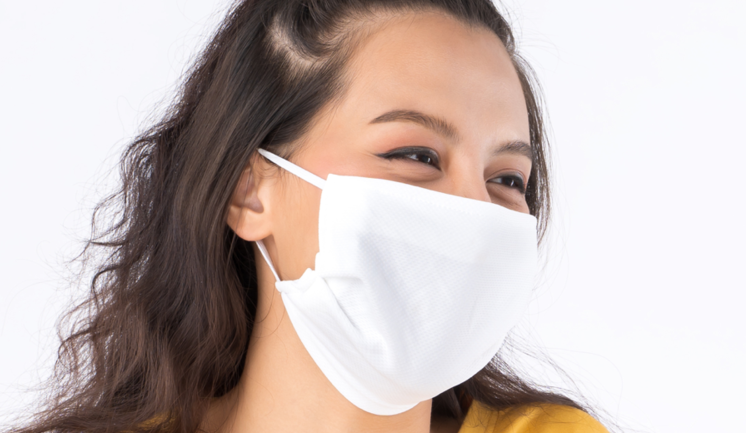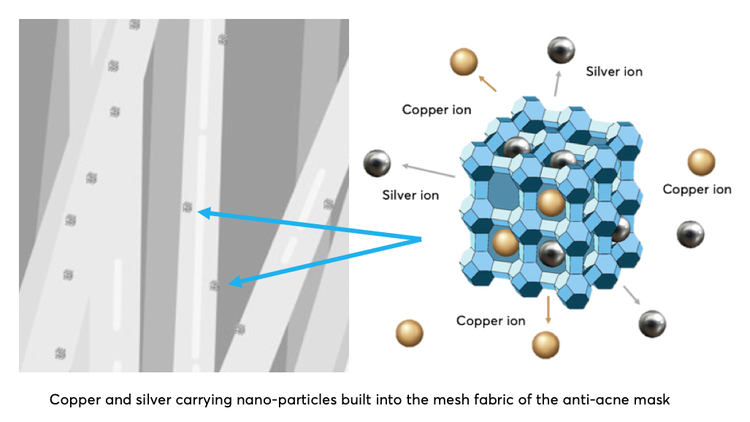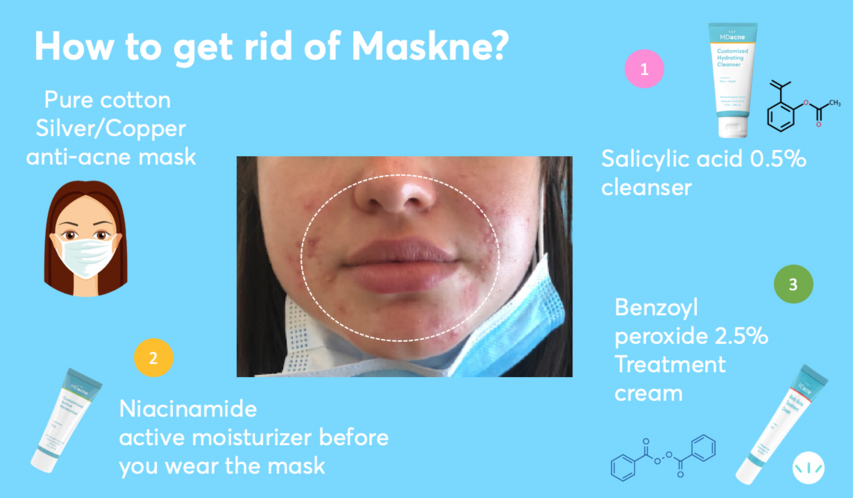How to prevent maskne - according to Dermatologists

With the COVID-19 pandemic, masks have become a daily essential—but they can also lead to increased acne, especially for those with sensitive or acne-prone skin. Here’s a quick guide on why masks can cause acne and what you can do about it!
Why Masks Cause Acne
Masks trap heat, moisture, and oil against your skin, creating a breeding ground for bacteria. This can lead to “maskne”—breakouts from prolonged mask use. Constant friction from the mask can also damage your skin’s outer barrier, making it more vulnerable to bacteria entering your pores and causing inflammation.
Choosing the Right Mask
The material of your mask matters! While most single-use masks are made of polypropylene (a plastic material similar to trash bags), reusable cloth masks made from breathable, natural cotton are less irritating. Some new cloth masks even use copper-infused fibers, which may help reduce acne by naturally controlling bacteria.
Not only are plastic masks a potential acne trigger, but they’re also harmful to the environment. Polypropylene masks don’t break down easily, shedding microplastics into oceans and harming marine life. Consider opting for washable cloth masks that are more eco-friendly.
11 Tips to Prevent Maskne
-
Cleanse and Moisturize Post-Mask:
Use a gel or water-based moisturizer to keep skin hydrated without clogging pores. Ingredients like aloe vera or tea tree oil can soothe irritated skin. -
Use a Fresh Mask Daily:
Disposable masks should be changed daily. Reusable masks should be washed after each use. -
Avoid Touching Your Mask:
Touching your mask transfers bacteria from your hands to your skin. Always wash hands if you must adjust your mask. -
Choose the Right Fit:
The mask should sit snugly but not tightly. Too-tight masks increase friction and irritation. -
Wash Your Face 2-3 Times Daily:
A gentle cleanser, especially one with salicylic acid, helps remove oil and impurities without drying out your skin. -
Use Oil-Free Wipes:
If you have oily skin, use blotting paper or oil-free wipes to keep the skin dry under your mask. -
Opt for Cotton Masks:
Natural cotton masks are breathable and help reduce sweat and oil buildup. -
Skip the Makeup:
Heavy foundations and concealers can clog pores. If you must wear makeup, keep it light. -
Avoid Petroleum-Based Products:
Thick products like petroleum jelly clog pores. Choose a lightweight, oil-free moisturizer instead. -
Let Moisturizer Absorb Before Masking Up:
Waiting 15 minutes after moisturizing helps prevent a slippery surface under the mask. -
Skip the Lip Gloss:
Gloss tends to stick to the mask. Opt for a lip serum or waxy balm instead.
By following these tips and choosing the right mask, you can protect yourself without compromising your skin health.
What’s the Best Treatment for Maskne?
The best way to beat maskne is to start with prevention! Opt for breathable cotton masks that won’t rub or trap heat and humidity on your skin. Avoid synthetic materials like polyester, which can create the perfect environment for bacteria and fungi.
For skincare, start with a mild, hydrating acne cleanser with a small dose of salicylic acid (no more than 0.5%) in the morning and evening. Skip cleansers with benzoyl peroxide or stronger salicylic acid concentrations, as they can be too harsh for sensitive areas around the mouth, leading to more breakouts.
After cleansing, pat your skin dry and apply an oil-free moisturizer. Look for one formulated for acne-prone skin and ideally with niacinamide, which helps protect the skin barrier, reduce acne-causing bacteria, and calm redness.
In the evening, a light layer of 2.5% benzoyl peroxide works wonders as an antibacterial and antifungal treatment. It helps reduce active red pimples faster than most anti-acne creams.
Choosing the Right Masks for Acne-Prone Skin
Some masks are better for acne-prone skin than others. Tight cloth masks made with synthetic materials like polyester, or single-use plastic surgical masks, trap heat and moisture, creating a breeding ground for bacteria like p. acnes and fungi. These masks can increase the risk of breakouts, especially if worn for extended periods.
For acne-prone skin, natural cotton masks (or even copper-infused masks) are a great choice, as they’re more breathable and less likely to trap moisture.

The best masks for acne-prone skin seem to be cloth masks impregnated from the inside and the outside with copper and silver fibers. Copper and silver particles have proven antibacterial, antifungal, and antiviral properties. These fibers are used extensively in hospital bedsheets to fight infections and can also be found in antibacterial and antimicrobial pillowcases to prevent acne breakouts.

How to Choose an Anti-Acne Face Mask
When choosing an anti-acne face mask, look for cotton masks that aren’t too tight and allow breathability to reduce heat and humidity under the mask. If you’re considering copper or silver-infused masks, note that many are only sprayed with metal particles on the outside, which helps with external germs but doesn’t directly impact acne. To help prevent maskne, the mask’s inner layer should be infused with these metal particles to reduce bacteria on the skin.
Tips for Wearing a Protective Mask During Acne Treatment
-
Cleanse Gently
Wash your face with a gentle acne cleanser. For the best results, look for one with BHA (salicylic acid) to penetrate pores, providing antibacterial and anti-inflammatory effects. -
Use Oil-Free Wipes
If your face gets too hot or sweaty under the mask, oil-free wipes can help keep your skin fresh and comfortable throughout the day. -
Stay on Top of Your Acne Treatment
Maintaining your acne routine is even more important now. A low-percentage benzoyl peroxide or salicylic acid treatment cream can help treat active pimples and prevent future mask-related breakouts. Avoid adapalene (Differin) if you have sensitive skin, as it’s generally more irritating. -
Moisturize Regularly
Use an oil-free, water-based moisturizer to protect and hydrate your skin without clogging pores. Apply a thin layer before wearing your mask, ideally after washing your face in the morning. For makeup, opt for a lighter, mineral-based foundation to avoid clogged pores.
What is Mask-Related Contact Dermatitis?
Contact dermatitis, or allergy-related eczema, occurs when the skin reacts to an allergen. Mask-related contact dermatitis presents as red, itchy skin under the mask area, differing from maskne, which causes pimples but typically doesn’t itch. Dermatitis usually affects a larger area and is marked by red, irritated patches.
How to Prevent Mask-Related Eczema
Some mask dyes can cause allergies, so choosing a white cotton mask is often the safest option. To further reduce allergy risk, wash your mask with a fragrance-free detergent and avoid fabric softeners.
More info on Anti-Acne Face Mask
Best face masks for people with acne-prone skin
To find the right acne treatments for your unique skin, take the free skin assessment by clicking here.




